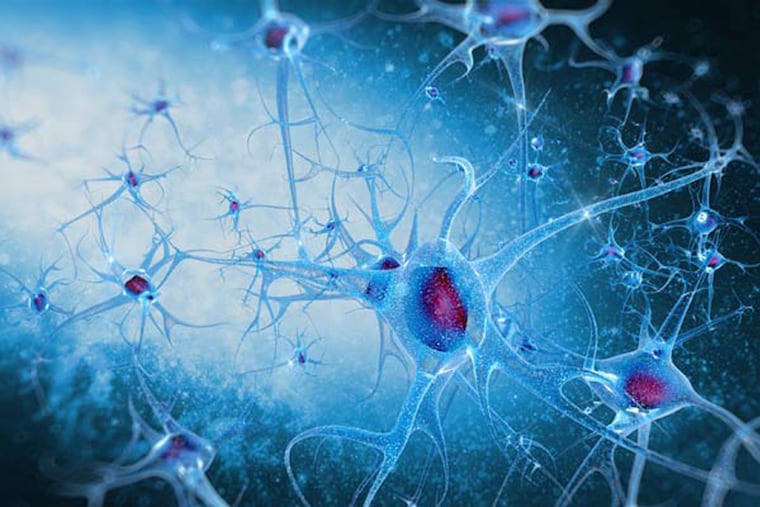Wanted: Brave volunteers for major Alzheimer's study
If you were at high risk for a deadly, untreatable disease, would you want to know it? Would you want to join a clinical trial?

If you were at high risk for a deadly, untreatable disease, would you want to know it? Would you want to join a clinical trial?
Alzheimer's researchers are hoping that a lot of people are so eager to find a cure that they will answer yes to both those questions.
GeneMatch, an ambitious, national effort to recruit people at high genetic risk for Alzheimer's disease, was launched Tuesday by the Banner Alzheimer's Institute in Phoenix and will include a key role for University of Pennsylvania researchers.
The registry of people who have been tested for variants of the APOE gene, the most powerful genetic predictor of the most common kind of Alzheimer's disease, will be a resource for researchers studying and combating the dreaded dementia. It also will be an opportunity to test the theory that experimental drugs might be more successful if administered years before Alzheimer symptoms emerge.
People who have lost family members to Alzheimer's often feel helpless, said Pierre Tariot, director of the Banner Alzheimer's Institute, during a media briefing. Participating in GeneMatch, he said, is a way for them to "be part of the movement to end this disease before another generation is lost."
People who sign up online will be sent test kits. They will not automatically be told the results, but disclosure will be required to be part of some trials.
Penn will oversee how potential trial participants are told about their genes. The goal is to help people understand and cope with disturbing news with consequences not only for them but also for their families.
Previous research has shown that troubling genetic information upsets people at first, but most recover without extra anxiety or depression.
"In the long term, most people do well and respond well to receiving genetic information," said Angela Bradbury, a Penn oncologist who will direct the Alzheimer's genetic counseling. She has previous experience with disclosing genetic information to patients who cannot be seen in person.
While some people may find it hard to live with knowing they are at higher risk, Bradbury pointed out that anyone who has watched a family member die of Alzheimer's is likely already worried.
Many people wonder if genetic information will be used against them, said Beth McCarty Wood, senior genetics counselor for Penn's telegenetics program. She will be involved in counseling GeneMatch patients and said some worries could be reasonable. Federal law protects against discrimination by health insurers and employers, but not by those who provide long-term care and life insurance.
The APOE gene comes in three types: APOE2, which is protective against Alzheimer's; APOE3, which raises risk some; and APOE4, which raises risk the most.
Only about 2 percent of the population has two copies of E4, one from each parent. An additional 15 percent has one copy.
Wood said the lifetime risk of developing Alzheimer's was 10 to 15 percent for people with two copies of the APOE3 variant. The risk rises to 20 to 25 percent for people with one E4 and to 30 to 55 percent for people with two E4s.
Factors that further increase risk are a family history of the disease, being female, and having cardiovascular disease or diabetes. Risk is lower for people with no family history or heart problems.
The first trial to use the GeneMatch patient pool will test two drugs from Novartis that target amyloid, one of the hallmark errant proteins that accumulate in the brains of people with Alzheimer's. It will begin early next year. Researchers want to test the drugs in people who are at high risk for Alzheimer's but do not yet have symptoms. People who want to be in that trial, which hopes to delay or prevent Alzheimer's, must learn their genetic test results.
Tariot said the Novartis trial needs 1,300 participants ages 55 to 75 with two copies of APOE4. Researchers expect that 80,000 people may need to be tested in order to fill that trial.
So far, anti-amyloid drugs have not done well in clinical trials, but Tariot pointed out that previous trials were done in people who were already symptomatic.
Because Alzheimer's is believed to begin more than a decade before symptoms become apparent, researchers are increasingly interested in trying potential treatments as early as possible.
Jamie Tyrone, who spoke at the press briefing, said she found out she has two copies of APOE4 as part of another study when she was 48. Now 55, she said she was blindsided and did not receive appropriate counseling. The news upset her so much that she considered suicide and eventually sought counseling.
The San Diego nurse went on to found Beating Alzheimer's by Embracing Science. She finds participating in research "empowering" and said she feels "very, very optimistic about the future."
People interested in participating in GeneMatch can get more information at www.endALZnow.org/GeneMatch.
GeneMatch is a program of the Alzheimer's Prevention Initiative, which Banner leads. It has enrolled more than 170,000 volunteers interested in participating in research.
215-854-4944@StaceyABurling